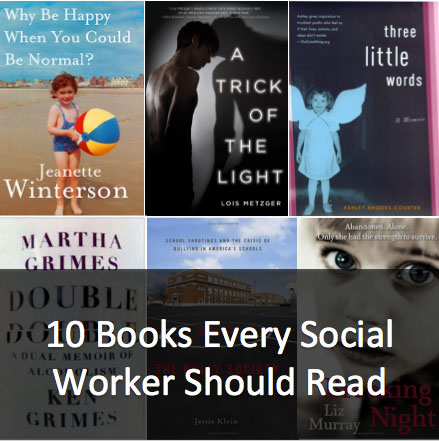10 Books Every Social Worker Should Read

Social workers are faced with helping clients and patients work through various issues — from substance abuse and depression to a lengthy adoption process and eating disorders. With so many resources online, it can be tough to find the best ones. Well, we’ve done the work for you — here are 10 books every social worker should read and why.
1. Saving Normal
By Allen Frances
Synopsis: Frances, who has been “credited with spearheading the anti-DSM-5 efforts,” delves further into what he believes to be over-diagnosis and over-medication of the general public.
What Social Workers Can Learn: Learn where you stand on the use of diagnoses and prescription medication. Read the scathing critique of DSM-5 and then use your clinical judgment accordingly.
2. A Trick of The Light
By Lois Metzger
Synopsis: This story, narrated through the voice of an eating disorder–anorexia–details the struggles of 14-year-old Mike as he overcomes his insecurities and body image issues.
What Social Workers Can Learn: Delve into the psyche of a teenage boy with anorexia to develop insight on how to combat eating disorders.
3. Double Double
By Ken Grimes
Synopsis: A mother and son explore their experiences of alcoholism and recovery together.
What Social Workers Can Learn: Compare mother and son as they confront addiction and define their own terms of success in recovery.
Learn More about MSW@USC.
4. The Bully Society: School Shootings and the Crisis of Bullying in America’s Schools
By Jessie Klein
Synopsis: Violence in schools is often perceived as acting “aggressive” and “masculine” in an effort to be popular. Klein explores the underlying causes of anxiety, eating disorders, suicide, depression, truancy and substance abuse.
What Social Workers Can Learn: Grapple with the emotional damage that gender policing can cause without having to re-experience high school.
5. Stir It Up: Lessons in Community Organizing and Advocacy
By Rinku Sen
Synopsis: The author uses her experiences rallying for economic justice with women’s groups to outline priorities and strategies to advance the mission of social change groups.
What Social Workers Can Learn: Learn how to rally for justice and strategize for social change.
6. Three Little Words
By Ashley Rhodes Courter, MSW ‘12
Synopsis: Courter chronicles her journey through 14 different foster homes, shuttling between schools and caseworkers, and enduring abuse from her foster family.
What Social Workers Can Learn: Pinpoint potential pitfalls in the foster care system and develop new ways to resolve issues, as well as educate others.
7. Why Be Happy When You Could Be Normal?
By Jeanette Winterson
Synopsis: Winterson delves into a lifetime of searching for happiness and her biological mother after experiencing abuse by her adoptive mother and discovering her love for words and women.
What Social Workers Can Learn: Wrangle with the complications of the adoption process and the surprising places people find their strength.
8. Prozac Nation
By Elizabeth Wurtzel
Synopsis: A memoir of Wurtzel’s experiences with major depression, hospitalization, therapy and medication.
What Social Workers Can Learn: Delve into the depths of depression as you step into the shoes of someone who experienced it firsthand.
9. Breaking Night
By Liz Murray
Synopsis: This memoir chronicles the author’s experience growing up as the neglected child of drug-addicted and mentally ill parents, living on the streets as an adolescent and finally getting a New York Times scholarship to attend Harvard University.
What Social Workers Can Learn: Be inspired by a story of human resilience despite a rocky and traumatic childhood.
10. It Gets Better: Coming Out, Overcoming Bullying, and Creating a Life Worth Living
By Dan Savage
Synopsis: In response to several highly publicized incidents of LGBT youth being bullied and driven to suicide, Savage began the It Gets Better Project, which began as a series of videos and evolved into a book of essays, written by celebrities and non-celebrities alike, that aims to engage young people who are struggling with their fears and feelings.
What Social Workers Can Learn: Build your capacity to provide hope when hope is scarce, which is applicable to LGBT youth, but also to anyone who is struggling.


